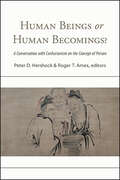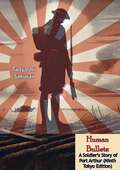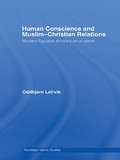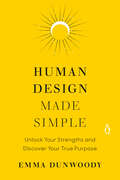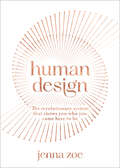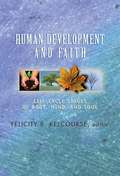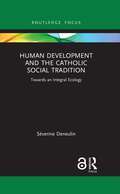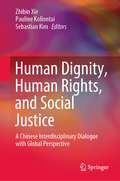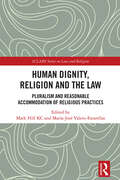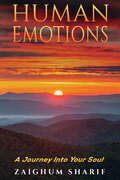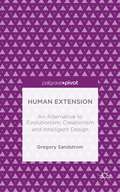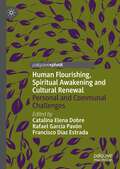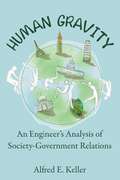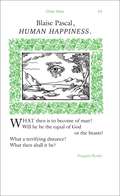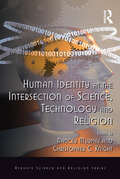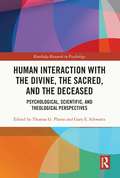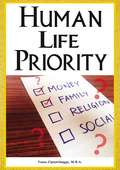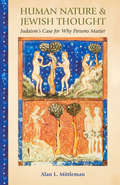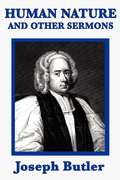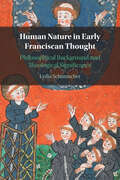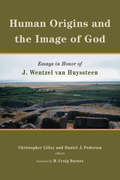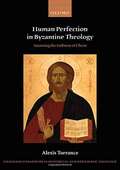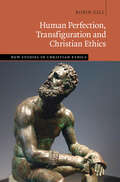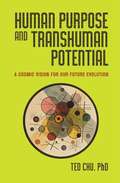- Table View
- List View
Human Beings or Human Becomings?: A Conversation with Confucianism on the Concept of Person (SUNY series in Chinese Philosophy and Culture)
by Peter D. Hershock; Roger T. AmesGreat transformations are reshaping human life, social institutions, and the world around us, raising profound questions about our fundamental values. We now have the knowledge and the technical expertise, for instance, to realize a world in which no child needs to go to bed hungry—and yet, hunger persists. And although the causes of planetary climate disruption are well known, action of the scale and resolution needed to address it remain elusive.In order to deepen our understanding of these transformations and the ethical responses they demand, considering how they are seen from different civilizational perspectives is imperative.Acknowledging the rise of China both geopolitically and culturally, the essays in this volume enter into critical and yet appreciative conversations with East Asian philosophical traditions—primarily Confucianism, but also Buddhism and Daoism—drawing on their conceptual resources to understand what it means to be human as irreducibly relational. The opening chapters establish a framework for seeing the resolution of global predicaments, such as persistent hunger and climate disruption, as relational challenges that cannot be addressed from within the horizons of any ethics committed to taking the individual as the basic unit of moral analysis. Subsequent chapters turn to Confucian traditions as resources for addressing these challenges, reimagining personhood as a process of responsive, humane becoming and envisioning ethics as a necessarily historical and yet open-ended process of relational refinement and evolving values.
Human Bullets: A Soldier's Story of Port Arthur (Ninth Tokyo Edition)
by Tadyoshi SakuraiTadyoshi Sakurai’s Human Bullets: A Soldier's Story of Port Arthur is a gripping firsthand account of the Russo-Japanese War (1904–1905), offering an unflinching look at the brutal realities of warfare. Written by a Japanese officer who fought in the Siege of Port Arthur, this memoir provides a rare and vivid perspective on one of the most significant military campaigns of the early 20th century.Sakurai’s narrative captures the courage, sacrifice, and unyielding spirit of the Japanese soldiers as they faced overwhelming odds in their quest to seize the heavily fortified Russian stronghold of Port Arthur. Through his candid descriptions, he conveys the physical and emotional toll of the battlefield, detailing the grueling assaults, the devastating losses, and the camaraderie among his comrades. The title, Human Bullets, reflects the soldiers’ unwavering dedication and willingness to serve as the very instruments of their nation’s military strategy.Beyond the harrowing combat scenes, Sakurai reflects on the larger themes of loyalty, patriotism, and the human cost of war. His writing is both raw and poignant, offering insights into the mindset of a soldier shaped by duty and honor.Human Bullets is not only a historical document but also a powerful anti-war statement that underscores the futility and tragedy of conflict. It remains a valuable resource for historians, military enthusiasts, and anyone seeking to understand the complexities of war from a deeply personal perspective.
Human Conscience and Muslim-Christian Relations: Modern Egyptian Thinkers on al-damir (Routledge Islamic Studies Series)
by Oddbjørn LeirvikHuman Conscience and Muslim-Christian Relations puts forward a discussion of how the notion of conscience may unite Muslim and Christians across religious divides, as well as examining the relation between selfhood and otherness in interfaith dialogue. The author explores how the notion of conscience has been dealt with by modern Egyptian authors and discusses their works in light of how Christian-Muslim relations in Egypt have evolved during the modern period.
Human Design Made Simple: Unlock Your Strengths and Discover Your True Purpose
by Emma DunwoodyThe simple, practical roadmap to unlocking your true powerHuman Design is a system based on our time and date of birth, and gives us the ultimate blueprint to our personality, energy, and authenticity. It offers a unique insight into who we are and how to achieve our potential—in all aspects of life.With the expert guidance of Human Design master coach Emma Dunwoody, you&’ll discover the transformative power of this ingenious system and how to make it work best for you. In simple steps, you&’ll find out:• How to truly understand yourself and embrace your superpowers• How to stop questioning yourself and trust in your intuition• What your energy type is and how to make it work for you• Ways to heal from the past and step into your lightWith journal prompts, future-visioning, and actionable tips on applying your new self-knowledge, Human Design Made Simple is your personalized toolkit to take your life in the direction you want to go.
Human Design: The Revolutionary System That Shows You Who You Came Here to Be
by Jenna ZoeFind guidance, alignment, and purpose with this insightful, practical guide to understanding and interpreting your Human Design chart.World-leading expert Jenna Zoe reveals the power and potential of Human Design in simple steps and shows you how to utilize your results to create an incredible life. Drawing inspiration from many different schools of wisdom, including the chakras, I Ching, astrology, and the Tree of Life, Human Design is a system based on our time and date of birth, illustrated as a unique chart that reveals our opportunities, challenges, personality, strengths, relationships, and much more.Once you have your chart, you can tap into a detailed and unique toolkit to help you unlock your true purpose in this world. You'll discover how to:generate your own chart with an easy-to-follow process find out what your Energy Type is and how you can harness itstop striving to be someone you're not and feel comfortable in your own skinunderstand your intuition, personality, habits, relationships, and moreWhen your chart reveals how to be the real you – the most individual you can be – you'll find that you're able to confidently walk your unique path and live according to your soul's purpose.
Human Development and Faith: Life-Cycle Stages of Body, Mind, and Soul
by Felicity B. KelcourseThis book brings together the best available understandings of human development from a multidisciplinary perspective. Uniquely inclusive of the moral and faith dimensions of context and life-cycle development, Human Development and Faith examines the interplay of mind, body, family, community, and soul at every stage of development. Its goal is to address two central questions: What are the "good-enough" conditions of parenting, family, and community in each phase of life, from birth to death, that support growth and development? What gives life adequate meaning as development proceeds? If human development describes the normative and hoped-for passages of life, then faith provides the necessary component of meaning. Throughout the various perspectives offered in this volume is the premise that faith is that quality of living that makes it possible to fully live.
Human Development and the Catholic Social Tradition: Towards an Integral Ecology (Routledge Research in Religion and Development)
by Séverine DeneulinThis book brings development theory and practice into dialogue with a religious tradition in order to construct a new, transdisciplinary vision of development with integral ecology at its heart. It focuses on the Catholic social tradition and its conception of integral human development, on the one hand, and on the works of economist and philosopher Amartya Sen which underpin the human development approach, on the other. The book discusses how these two perspectives can mutually enrich each other around three areas: their views on the concept and meaning of development and progress; their understanding of what it is to be human – that is, their anthropological vision; and their analysis of transformational pathways for addressing social and environmental degradation. It also examines how both human development and the Catholic social tradition can function as complementary analytical lenses and mobilizing frames for embarking on the journey of structural and personal transformation to bring all life systems, human and non-human, back into balance. This book is written for researchers and students in development studies, theology, and religious studies, as well as professional audiences in development organizations.
Human Dignity, Human Rights, and Social Justice: A Chinese Interdisciplinary Dialogue with Global Perspective
by Pauline Kollontai Sebastian Kim Zhibin XieThis book explores human dignity, human rights and social justice based on a Chinese interdisciplinary dialogue and global perspectives. In the Chinese and other global contexts today, social justice has been a significant topic among many disciplines and we believe it is an appropriate topic for philosophers, theologians, legal scholars, and social scientists to sit together, discuss, enrich each other, and then deepen our understanding of the topic. Many of them are concerned with the conjuncture between social justice, human rights, and human dignity. The questions this volume asks are: what’s the place of human rights in social justice? How is human dignity important in the discourse on human rights? And, through these inquiries, we ask further: how is possible to achieve humanist justice? This volume presents the significance, challenges, and constraints of human dignity in human rights and social justice and addresses the questions through philosophical, theological, sociological, political, and legal perspectives and these are placed in dialogue between the Chinese and other global settings. We are concerned with the norms regarding human dignity, human rights and social justice while we take seriously into account their practice. This volume consists of two main sections. The first section examines Chinese perspectives on human rights and social justice, in which both from Confucianism and Christianity are considered and the issues such as patriotism, religious freedom, petition, social protest, the rights of marginalized people, and sexual violence are studied. The second section presents the perspectives of Christian public theologians in the global contexts. They examine the influence of Christian thought and practice in the issues of human rights and social justice descriptively and prescriptively and address issues such as religious laws and rights, diaconia, majoritarianism, general equality, social-economic disparities, and climate justice from global perspectives including in the contexts of America, Australia, Israel and Europe. With contributions by experts from mainland China, Hong Kong, South Korea, Australia, New Zealand, the UK, USA and Norway, the book provides valuable cross-cultural and interdisciplinary insights and perspectives. As such it will appeal to political and religious leaders and practitioners, particularly those working in socially engaged religious and civil organizations in various geopolitical contexts, including the Korean Peninsula and Japan.
Human Dignity, Religion and the Law: Pluralism and Reasonable Accommodation of Religious Practices (ISSN)
by Mark Hill Kc María-José Valero-EstarellasThe concept of human dignity is already embedded in the constitutional architecture of the European Union and throughout the world, but it remains a slippery and elusive concept. In this volume, leading commentators from across the globe address the shift from the monolithic influence of major world religions in the past towards religious pluralism coupled with the increased secularism of civil society. The contributors, drawn from different backgrounds and traditions, explore how the deployment of a nuanced understanding of human dignity can provide a way to maximise religious liberty for all within liberal democracies. Specific consideration is given to the reasonable accommodation of religious practices through exemptions to generally applicable laws, conscientious objection on the grounds of religious beliefs, the interplay between religious pluralism and legal pluralism, balancing religious sensibilities with same-sex marriage, exercising the right to change one’s religion, both generally and with a particular focus on data protection, protecting the right to asylum in the light of recent changes in migratory flows and exploring its impact on those enjoying non-theistic beliefs, as well as the complex relationship between the Ukrainian and Russian Orthodox Churches in these febrile times. Through the prism of informed investigation of these matters of specificity, the volume offers readers fresh insights and analysis which collectively contribute to an overall picture of governments in liberal democracies being encouraged and enabled to foster laws and practices whereby pluralism can be encouraged, and human dignity can flourish. The book will be of interest to academics, researchers and policy-makers working in the areas of Law and Religion, Human Rights Law, Constitutional Law and International Relations.
Human Emotions
by Zaighum SharifEach and everyone of us has our own human emotions. Days can be filled with happiness whereas other days can be full of sadness. The uniqueness of one’s emotions can very rarely be understood by others. It is really difficult if not impossible to tell others how you feel or for them to understand how you are feeling. I have tried in this book to cover the inner most boundaries of human emotions splitting my poems into different realms of human thought. Hope, fate and destiny, joy, life, the world, loneliness, love, regrets, religion and the future are all covered in this book. I hope the reader can relate to and understand my poems and bring some perspective and reasoning towards their life. We are all not the same and never can be but we all have a heart and soul. By identifying these moments of thought I hope I can bring perspective and understanding to the reader. I hope you enjoy my book.
Human Extension: An Alternative to Evolutionism, Creationism and Intelligent Design
by Gregory SandstromThis book proposes a new angle on the controversy over evolution as a biological theory, creation as a theological/worldview doctrine and evolutionism, creationism and Intelligent Design theory as social ideologies. Rather than presenting a polemic that will enrage or delight one camp or another, this book proposes that a cease-fire is possible.
Human Flourishing, Spiritual Awakening and Cultural Renewal: Personal and Communal Challenges
by Francisco Díaz Estrada Catalina Elena Dobre Rafael García PavónThis book seeks to generate a theoretical and a reflective framework to re-connect people with culture and spirituality. It seeks to recreate important links between these domains to provide interpretative, foundational, and ethical perspectives. It is distinctive in that it focusses on the challenges that humanity is facing at a cultural, social, moral, and spiritual level. It provides a philosophical understanding of humanity from a humanistic and multidisciplinary perspective (encompassing ethics, language, art/cinema, political, cultural and gender approaches) and offers a variety of ways of how we can rethink our culture and our society for the future.
Human Gravity: An Engineer’s Analysis of Society-Government Relations
by Al KellerHumanity lives inside 4 unyielding constraints, the speed of light, conservation of mass-energy, inefficiency in conversion of heat to work, and the law of demand. Society forms to deal with constraint. Government and religion set boundaries for society to deal with modeling and manipulating constraint.A societal dimension, moral consequence, and a government dimension, fairness, can be developed from mass-energy conservation equations for Society and its Economy. A model is proposed to relate these dimensions developing the Societal Operating Line (SOL) and definition of Productivity.The stability of a society can be determined by the forces applied to the SOL. A stable society will balance the forces of productivity and order versus the force of adversity. A special case of the forces acting on the SOL leads to the definition of a right, the fundamental building block of a Free Society.Improving fairness by government taking productivity from society is the basis for the Managed Society. In order to make society fairer, government takes more productivity and reduces the free exercise of rights to the point of demanding complete conformity.Government&’s role in a Free Society can be modeled by comparing the economic function of society with a common engineering structure-the boiler. This role is likened to keeping the boiler water clean by removing contamination through &“blowdown&”. In a Managed Society, government manipulates &“blowdown&” to increase its power and influence.Applying these engineering models helps us to understand the material and energy balances of our societal-government relationship. A Free Society is shown to prosper because of unbound spiritual energy transfer while a Managed Society is shown to be limited by the finite distribution of things.
Human Happiness (Penguin Great Ideas)
by Blaise PascalCreated by the seventeenth-century philosopher and mathematician Pascal, the essays contained in Human Happiness are a curiously optimistic look at whether humans can ever find satisfaction and real joy in life – or whether a belief in God is a wise gamble at best. Throughout history, some books have changed the world. They have transformed the way we see ourselves – and each other. They have inspired debate, dissent, war and revolution. They have enlightened, outraged, provoked and comforted. They have enriched lives – and destroyed them. Now Penguin brings you the works of the great thinkers, pioneers, radicals and visionaries whose ideas shook civilization and helped make us who we are.
Human Identity at the Intersection of Science, Technology and Religion (Routledge Science and Religion Series)
by Christopher C. KnightHumans are unique in their ability to reflect on themselves. Recently a number of scholars have pointed out that human self-conceptions have a history. Ideas of human nature in the West have always been shaped by the interplay of philosophy, theology, science, and technology. The fast pace of developments in the latter two spheres (neuroscience, genetics, artificial intelligence, biomedical engineering) call for fresh reflections on what it means, now, to be human, and for theological and ethical judgments on how we might shape our own destiny in the future. The leading scholars in this book offer fresh contributions to the lively quest for an account of ourselves that does justice to current developments in theology, science, technology, and philosophy.
Human Interaction with the Divine, the Sacred, and the Deceased: Psychological, Scientific, and Theological Perspectives (Routledge Research in Psychology)
by Gary E. Schwartz Thomas G. PlanteHuman Interaction with the Divine, the Sacred, and the Deceased brings together cutting-edge empirical and theoretical contributions from scholars in fields including psychology, theology, ethics, neuroscience, medicine, and philosophy, to examine how and why humans engage in, or even seek spiritual experiences and connection with the immaterial world. In this richly interdisciplinary volume, Plante and Schwartz recognize human interaction with the divine and departed as a cross-cultural and historical universal that continues to concern diverse disciplines. Accounting for variances in belief and human perception and use, the book is divided into four major sections: personal experience; theological consideration; medical, technological, and scientific considerations; and psychological considerations with chapters addressing phenomena including prayer, reincarnation, sensed presence, and divine revelations. Featuring scholars specializing in theology, psychology, medicine, neuroscience, and ethics, this book provides a thoughtful, compelling, evidence-based, and contemporary approach to gain a grounded perspective on current understandings of human interaction with the divine, the sacred, and the deceased. Of interest to believers, questioners, and unbelievers alike, this volume will be key reading for researchers, scholars, and academics engaged in the fields of religion and psychology, social psychology, behavioral neuroscience, and health psychology. Readers with a broader interest in spiritualism, religious and non-religious movements will also find the text of interest.
Human Life Priority
by Yunus CiptawilanggaThe writer thought of this topic because when he came to a funeral, a question would often pop up: "Actually, what is a human being’s main task in this life?" And it turned out that it has also been thought over by Solomon and discussed in the book of Ecclesiastes.
Human Nature & Jewish Thought: Judaism's Case for Why Persons Matter
by Alan L. MittlemanThis book explores one of the great questions of our time: How can we preserve our sense of what it means to be a person while at the same time accepting what science tells us to be true--namely, that human nature is continuous with the rest of nature? What, in other words, does it mean to be a person in a world of things? Alan Mittleman shows how the Jewish tradition provides rich ways of understanding human nature and personhood that preserve human dignity and distinction in a world of neuroscience, evolutionary biology, biotechnology, and pervasive scientism. These ancient resources can speak to Jewish, non-Jewish, and secular readers alike.Science may tell us what we are, Mittleman says, but it cannot tell us who we are, how we should live, or why we matter. Traditional Jewish thought, in open-minded dialogue with contemporary scientific perspectives, can help us answer these questions. Mittleman shows how, using sources ranging across the Jewish tradition, from the Hebrew Bible and the Talmud to more than a millennium of Jewish philosophy. Among the many subjects the book addresses are sexuality, birth and death, violence and evil, moral agency, and politics and economics. Throughout, Mittleman demonstrates how Jewish tradition brings new perspectives to--and challenges many current assumptions about--these central aspects of human nature.A study of human nature in Jewish thought and an original contribution to Jewish philosophy, this is a book for anyone interested in what it means to be human in a scientific age.
Human Nature and other Sermons
by Joseph ButlerJoseph Butler was an English bishop, theologian, apologist, and philosopher. He was born in Wantage in the English county of Berkshire. He is known, among other things, for his critique of Thomas Hobbes's egoism and John Locke's theory of personal identity. During his life and after his death, Butler influenced many philosophers, including David Hume, Thomas Reid, and Adam Smith.
Human Nature in Early Franciscan Thought: Philosophical Background and Theological Significance
by Lydia SchumacherIn this book, Lydia Schumacher challenges the common assumption that early Franciscan thought simply reiterates the longstanding tradition of Augustine. She demonstrates how scholars from this tradition incorporated the work of Islamic and Jewish philosophers, whose works had recently been translated from Arabic, with a view to developing a unique approach to questions of human nature. These questions pertain to perennial philosophical concerns about the relationship between the body and the soul, the work of human cognition and sensation, and the power of free will. By highlighting the Arabic sources of early Franciscan views on these matters, Schumacher illustrates how scholars working in the early thirteenth century anticipated later developments in Franciscan thought which have often been described as novel or unprecedented. Above all, her study demonstrates that the early Franciscan philosophy of human nature was formulated with a view to bolstering the order's specific theological and religious ideals.
Human Origins and the Image of God: Essays in Honor of J. Wentzel van Huyssteen
by Christopher Lilley and Daniel J. PedersenHow did human beings originate? What, if anything, makes us unique? These questions have long been central to philosophers, theologians, and scientists. This book continues that robust interdisciplinary conversation with contributions from an international team of scholars whose expertise ranges from biology and anthropology to philosophical theology and ethics. The fourteen chapters in this volume are organized around Wentzel van Huyssteen's pioneering work in human rationality, embodiment, and evolutionary history. Bringing a variety of diverse perspectives to bear on a hotly debated issue, Human Origins and the Image of God showcases new research by some of today's finest scholars working on questions regarding human origins and human uniqueness.
Human Perfection in Byzantine Theology: Attaining the Fullness of Christ (Changing Paradigms in Historical and Systematic Theology Series)
by Alexis TorranceTo what kind of existence does Christ call us? Christian theology has from its inception posited a powerful vision of humanity's ultimate and eternal fulfilment through the person and work of Jesus Christ. How precisely to understand and approach the human perfection to which the Christian is summoned is a question that has vexed the minds of many and diverse theologians. <p><p>Orthodox Christian theology is notable for its consistent interest in this question, and over the last century has offered to the West a wealth of theological insight on the matter, drawn both from the resources of its Byzantine theological heritage as well as its living interaction with Western theological and philosophical currents. In this regard, the important themes of personhood, deification, epektasis, apophaticism, and divine energies have been elaborated with much success by Orthodox theologians; but not without controversy. <p><p>Human Perfection in Byzantine Theology addresses the question of human perfection in Orthodox theology via a retrieval of the sources, examining in turn the thought of leading representatives of the Byzantine theological tradition: St Maximus the Confessor, St Theodore the Studite, St Symeon the New Theologian, and St Gregory Palamas. The overarching argument of this study is that in order to present an Orthodox Christian understanding of human perfection which remains true to its Byzantine inheritance, supreme emphasis must be placed on the doctrine of Christ, especially on the significance and import of Christ's humanity. The intention of this work is thus to keep the creative approach to human destiny in Orthodox theology firmly moored to its theological past.
Human Perfection, Transfiguration and Christian Ethics (New Studies in Christian Ethics)
by Robin GillMost people would agree that human perfection is unattainable. Indeed, theologians have typically expressed ambivalence about the possibility of human perfection. Yet, paradoxically, depictions of human perfection are widespread. In this volume, Robin Gill offers an interdisciplinary study of human perfection in contemporary secular culture. He demonstrates that the language of perfection is present in church memorials, popular depictions of sport, food, music and art, liturgy, and philosophy. He contrasts these examples with the socio-psychological concept of 'maladaptive perfectionism', using commercial cosmetic surgery as an example, as well as the 'adaptive perfectionism' suggested in the lives of Henry Holland, Paul Farmer, and, more ambivalently, Ludwig Wittgenstein. Gill then provides an in-depth analysis of New Testament and Septuagint usage of teleios and theological debates about the human perfection of Jesus. He argues that the Synoptic accounts of the Transfiguration offer a template for a Christian understanding of perfection that has important ecumenical implications within social ethics.
Human Purpose and Transhuman Potential: A Cosmic Vision for Our Future Evolution
by Ted Chu[from inside flaps] ""Today we stand at a new frontier. We have within our sight--if not yet within our reach--a radically new human freedom. It is the freedom from our inborn genetic condition--the liberation from the constraints of our biological form.... The human era as we have known it is coming to an end. The posthuman era is about to begin." So writes Ted Chu, in this magisterial treatment of the increasingly timely debate about transhumanism and the meaning and purpose of human evolution. A prominent macroeconomist and polymath, Chu offers the most systematic effort yet to explore the scientific, historical, ethical, and philosophical dimensions of this worldwide discussion, reframing a field too often disfigured by scientific reductionism. Chu immediately establishes an interdisciplinary and evolutionary stance and then examines the ongoing transhumanist project from a rich variety of perspectives. He goes on to articulate a goal for humanity in the face of technological breakthroughs that beckon us toward previously unimagined potentials for progress--that is, if we can find the courage to consciously manage our own evolution. A new understanding of transhumanism emerges as he plumbs the depths of the world's wisdom traditions and surveys the most cutting-edge evolutionary theories and scientific advances. While admitting that the pursuit of human happiness is appropriate and noble, Chu demonstrates why our ultimate purpose--our "new divine covenant"--is to serve the forward march of cosmic evolution through the transcendence of our own biology, thus making way for our evolutionary successors in the posthuman future."
